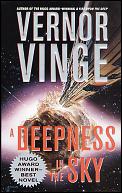
| Publisher: | Tor |
| Copyright: | March 1999 |
| Printing: | January 2000 |
| ISBN: | 0-812-53635-5 |
| Format: | Mass market |
| Pages: | 774 |
Let me say right off that despite not having quite the level of deeply fascinating ideas of A Fire Upon the Deep (the collective mind aliens and the galactic zones being the particularly major ideas), this is a better book. The characters are slightly more real, there's more actual development and change in both their personalities and their interactions, and there's a better story here.
Two ramscoop exploration fleets both arrive at a world whose sun is a long-term variable star, completely dormant for hundreds of years and then awaking in brilliant activity for a brief period of time before going dormant again, just as the star is about to heat up. Quickly, the heroes find themselves on the losing end of a war with the other explorers while trying to manage a first contact situation with truly unusual aliens awaking from their hibernation, while the aliens are going through a scientific revolution. Over the course of the story, in flashbacks, the history of that region of human space is told.
For those who have read A Fire Upon the Deep, this is the story of the ramscoop captain found in that book, set thousands of years prior.
In the words of Phil Fraering on rec.arts.sf.written in August of 1999:
A group of interstellar-trading Poul Anderson protagonists struggle against a bunch of S.M. Stirling villians, 200 years' travel from civilization above a planet full of C.J. Cherryh aliens, as translated by Bilbo Baggins, Esquire.
I couldn't put it better. Unfortunately, despite the intriguing premise, this can be a rather painful book to read. That doesn't mean that it's not a good book, or even not one that I'd recommend, but just that something about the book persistently got under my skin in a way similar to A Fire Upon the Deep.
I think it's partly because of how Vinge creates situations where either the bad guys are dominant and in control, or where the good guys are obviously heading for trouble in the form of a slow but unavoidable train wreck, and then lets those situations persist for vast swaths of time. These situations aren't unrealistic, and some of the underlying frustration and hopelessness is well-portrayed, but I don't read books to feel frustration and hopelessness and I found this book sometimes emotionally exhausting. It made me angry, and not in a way that resulted in a clean release of emotion.
The ending is, however, well-handled and is a decent payoff for getting through the book. There's a fairly good plot twist that really emphasizes the payoff, although the denouement is fairly bittersweet and drags some. (And frustratingly so, since this isn't the fault of the plot, but rather the author's lack of attention to the celebration and positive feelings. I can understand a quick ending, but if you're going to drag the ending out as long as Vinge did in this book and the characters are happy for stretches of that time, please show that to us and let us enjoy it. Particularly if you've been dragging us through the emotional gutter for most of the book.)
In terms of ideas, the book is basically space opera of the ramscoop variety, familiar to any reader of Niven or innumerable other classic SF authors. There are some pretty interesting elaborations on the theme, and a nicely built astronomical anomaly to serve as the centerpiece, but I found myself wishing for a little more bang in a few places. The aliens are okay, if extremely human despite drastic body shape and perception differences. (Minor gender role inversion is not a sufficient departure to be believable for a truly alien species.) They're not Star Trek humans with brow ridges, but neither are they well-done aliens by the standards of A Fire Upon the Deep or even David Brin's Uplift series.
If the main evil of this book doesn't squick you quite as much as it does me, or if you're better at putting up with squickful things persisting through most of the book, you may like this book better than I did. There are some problems with unchanging chess-piece characters still, but far less than A Fire Upon the Deep had, and mostly around the ancillary characters. I want to like this book more than I did, and my rating reflects that. But I still can't shake the feeling of being happy that I finished it.
Reviewed: 2003-12-31